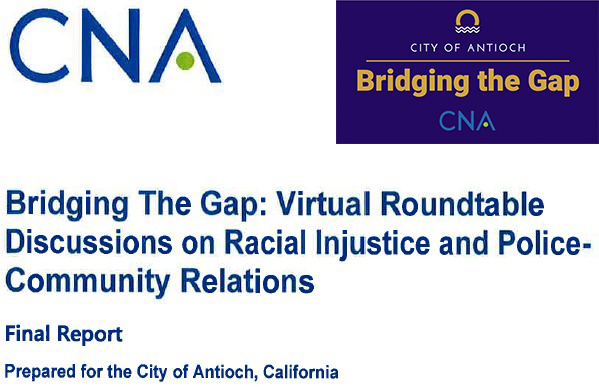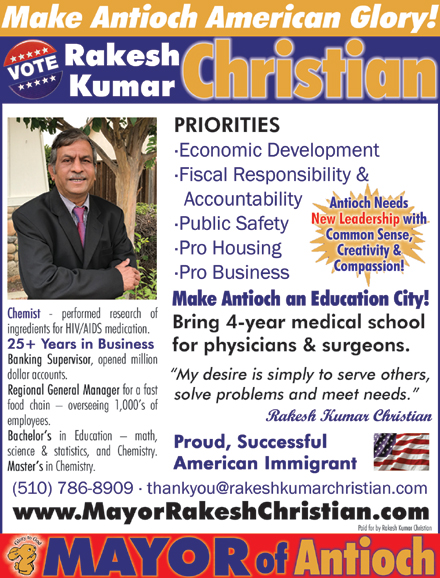Antioch Council calls out flaws in Bridging the Gap forums, consultant’s report, but votes 3-2 to accept it

Torres-Walker “acknowledges” Wright, Motts for process, Thorpe reminds her she and current council voted for it;
Only 114 residents and business owners participated in the three closed door discussions; City spent $55,000 for the process;
“This report in my opinion does not reflect the views of the community and we should not change an entire organization based on its recommendations.” – District 2 Councilman Mike Barbanica
“There were not enough people of color in the discussion, not enough Black people in the room” – District 1 Councilwoman Torres-Walker
“The woman who was facilitating my group…her report out was completely inaccurate” – Mayor Pro Tem Monica Wilson
Thorpe takes dig at Barbanica and Ogorchock for voting against accepting report
By Allen Payton
During their meeting, Tuesday night, March 23, all five Antioch City Council members pointed out flaws in the process and results contained in the final report from consultants on the three Bridging the Gap Virtual Roundtable Discussions on Racial Justice and Police-Community Relations. Nevertheless, instead of sending it back to the consultants and directing them to get it right and come back with an acceptable report, the council voted 3-2 in favor of accepting it, with only District 2 Councilman Mike Barbanica and District 3 Councilwoman Lori Ogorchock voting against the motion. (See council meeting video, beginning at about the 3:55:00 mark)
The report states CNA, the consulting firm hired to facilitate the forums, performed three post-event surveys and received 63 completed surveys. “CNA prepared a summary of survey responses including all written comments that were provided,” the report explains. However, that summary wasn’t included in the report, but “that report will be delivered under a separate cover.”
Lead consultant Hildy Saizow, Senior Advisor of CNA’s Center for Justice Research and Innovation, presented the report to the council stating, “the recommendations are based on community sentiments expressed in the discussions.” Second, they were based on “CNA’s knowledge of best practices in policing” and “Not based on an assessment of APD.” Bridging The Gap Final Report

Very Low Participation
The report shows that prior to the three discussions, out of 450 residents who opened a survey “to gauge the interest and availability of potential participants” including “the best dates and times, their access to and comfort with Zoom, and their willingness to participate on camera and to read materials in advance of the conversations,” “only 65 completed it.”
Yet, the forums were still held, including the final one at 10 a.m. on a Thursday, and council members complained about the lack of participation. Initially, the guidelines only allowed 75 participants in each session, with 15 people in each of five closed-door, round table, breakout groups. The consultants later increased the number of participants allowed. According to the report, out of 75 people who registered for the Jan. 19th discussion on Police Oversight, Accountability and Transparency, 57 participated; of the 99 who registered for the Feb. 6th discussion on Racial Disparities in Policing, only 36 participated; and finally of the 125 who registered for the discussion held on the morning of February 18th, only 21 participated for a total of 114 participants out of 299 who had registered, which is less than 0.1% of the city’s estimated population of 118,000.
Both council members and police officers observed the round table discussions to listen but did not participate.
The report offered 19 recommendations for the police department to implement under each of the three discussion topics, some of which Chief Tammany Brooks has already been implementing.
Council Critical of Entire Process That They Approved and Report
The council members weren’t happy with the process, the participation levels nor the report of what was discussed in the round table groups and said little about the proposed recommendations.
“The experience I had here was quite a bit different,” Barbanica said. “And I appreciate was attempted to be accomplished here. When I first started in this process, I had set up a time to reach out…and get in touch with CNA and have a private session. I attended the meeting, it was about 7 a.m. only to find out halfway through the meeting I found out I was in another city’s meeting. I made it clear I was in support of law enforcement one of the members started laughing. I asked them ‘why are you laughing?’ I didn’t get a real warm feeling of what was going on.”
Barbanica Opposes Changing PD Based on Report
“One-tenth of 1% of our community participated in this,” he continued. “I am for a lot of the things that were brought up here, tonight and I’ve been supportive of them, transparency, more training, body cameras, recruitment, youth involvement. All for that. But one of the problems that I saw with this process is…I attended all sessions. The first session…I was keeping a tally of what people were bringing up…and there wasn’t support in the group of civilian oversight. When we went back and reported out…the facilitator said, “overwhelmingly our group supported…civilian oversight.” He emailed CNA that evening and asked to watch the video of the session. “I said the numbers aren’t adding up here to what was reported. When they emailed me back, they said… ‘sorry, that was the one area that wasn’t recorded.”
“Then I started getting calls from other people that had attended other sessions and they were telling me the same thing, what their groups were actually reporting and talked about, were not reported with the actual facilitator when they came back,” Barbanica said.
“This cost us as a community, almost $55,000 and the police department wasn’t even allowed to participate in this or give any info,” he concluded. “This report in my opinion does not reflect what the community said in those meetings and it’s such a small sample of the community that how can we change an entire organization based on that.”
Torres-Walker Takes Swipe at Former Mayor, Mayor Pro Tem
“I want to acknowledge our former council, former Mayor Sean Wright and City Council Member Joy Motts who voted for this process. It was proposed by the former mayor,” said District 1 Councilwoman Tamisha Torres-Walker said rather backhandedly. “And it was in lieu of an ad hoc committee that could have did just as much work and probably produced just as much, maybe the same results or different. We’ll never know because this process was proposed by the last council and championed by Sean Wright. So, that’s one point of fact, right there.”
“A lot of folks had reservations about the process, because we didn’t think that there would be enough participation, especially from people who have been impacted by, whether it was, you know police misconduct, harassment, whatever, what not. But we moved forward because people wanted a public process,” she continued. “Yes, participation was limited. I didn’t necessarily agree with that.”
Wanted Police to Participate “To Hear The Harm That They Pose”
“Also…I was informed that the police probably wouldn’t even participate because some people felt like it wouldn’t be safe for them to be transparent in their experience, for them to talk about their experience while law enforcement was in the room,” Torres-Walker stated. “And I specifically said ‘well, you can’t hold someone accountable if they’re not in the room to hear the harm that they pose on the community.’ Like, how can you hold me accountable as to a relationship if I’m not in the room? So, I wanted law enforcement to be in the room.”
“None of us participated,” she continued. “So, when everybody says law enforcement didn’t get to participate, they didn’t get to provide their input, nobody asked them any questions. We didn’t speak in these meetings. We were all observers. None of us fully participated. But because it was a community process, we decided that it was reasonable to step back and let the community have a voice.”
Blames Police Department for Lack of Information
“I want to highlight that there was one thing that came out in a group that I was in when we looked at the police data,” Torres-Walker continued. “People were like, what does this data say…how do we know if this data is telling the truth about the situation? This data was provided by the police department.”
“So, if you have a problem with the data, then you have to take those complaints to the police department,” she stated.
“I think there were people who felt like the report backs from the groups weren’t robust enough. I got phone calls myself,” Torres-Walker shared. “But I think it was an investment. People put in the time and we have to figure out how to make this work with some of the platform that the mayor has already put forward and we have already started to move on this council.”
“One thing I will say is that it says racial justice…and there were not enough people of color in the room, in this discussion, and not enough Black people and I want to point that out, as well,” she stated. “I also want to say that in one of my meetings someone said, ‘you know, I was here before the Blacks got here’. And I think that’s why we need to have conversations about race in this city. Because those same people are quoting Malcolm X, quoting MLK while also spewing hate about Black people. So, we really have a lot of work still to do. I appreciate this process that was recommended and championed by the former mayor and hope we can move some of this forward.”
Thorpe Corrects Torres-Walker
“This entire process was interestingly very public,” Mayor Lamar Thorpe stated refuting Torres-Walker’s comments. “We actually voted for the very process. This council, all five of us, here voted. I brought this forward to the council to get feedback as to what direction we wanted to go in and you all voted for the very process that we were in. To create some type of ulterior narrative that something different happened was the very process all five of us either voted or we gave direction. But it was unanimous. I recall that because Rosanna and Ron brought that to me, and I said let’s take it to the council and let them decide. This was the process all five of us voted collectively.”
Ogorchock Wanted Police to Participate
“I agree that we five would not say anything. So, we voted that we would not speak. I agree 110% with that,” Ogorchock said. “But I don’t agree with our police department and police chief not give what the police department is doing. To bridge a gap, to me, all parties have to participate. If we had a conversation with our police chief we would know what he’s been doing. There’s Coffee with the Cops. So, I find it odd that had there been a conversation with him…we would have known what the police department is doing and we wouldn’t have had some of these.”
“In reading some of the stuff, it talks about youth engagement…SRO’s would have done exactly what this is saying,” Ogorchock stated.
“I don’t agree with the report. I do believe there are a lot of things that are in here, there are a lot of things that are being done,” she added.
Wilson Also Critical of Process, Report
“I have mixed feelings. I too was disappointed with the attendance,” said Mayor Pro Tem and District 4 Councilwoman Monica Wilson. “I don’t know if that was a combination of did we do enough outreach or did we do the right kind of outreach. I know we had one of the meetings, it was supposed to be a Spanish-speaking meeting. I went to all of them and two of my groups…there was two individuals that were in my previous groups. So, obviously there was some repeats going on. Some people had difficulties logging in. Sometimes they got the log-in information late.”
“The woman who was facilitating my group…her report out was completely inaccurate. I was wondering if I was in the same group,” she continued.
“I think in one meeting there were three city council members, the city manager and two officers in the same room,” Wilson shared. “I’m just going to take what was reported out…I’m just going to walk away with this is what we should be working on.”
“Yes, we can take some items and learn from them and get better,” Barbanica added. “I just don’t agree with all of them. For the record, when all of this started, I reached out to the city manager and said I didn’t agree with the process with the police department not being involved.”
“This was a conversation that the community wanted to have. We had a lot of engagement at the beginning. We know that these are difficult and challenging conversations to have,” Thorpe stated. “As our work with the committee of the whole, we will apply what we choose to apply. We already have the direction we’re going in regards to police reform. Hopefully this adds some value to our discussions as we try to move forward.
Council Splits 3-2 on Accepting Report
“Are we accepting the report? Do we need to accept the report,” he asked.
“The agenda does include a recommended action to formally accept the report,” responded Assistant City Manager Rosanna Bayon Moore.
Torres-Walker then moved approval to accept the final report. Wilson seconded the motion.
“What if I don’t accept the report. What if I don’t agree with the outcomes of the report?” Ogorchock asked.
“Then, that’s your choice. You can vote however you want,” Thorpe replied.
“Yes, you can vote however you want,” City Attorney Thomas Smith interjected. “If a majority of the city council didn’t accept the report then my thought is you can give direction whether or not something that is missing or whether there is something there. Or you can just not to accept it.”
“A lot of these things, you know they are are general categories…on that youth recommendation, were you specifically talking about cops on school campuses?” Thorpe asked Saizow, in response to Ogorchock’s earlier comment.
“No,” she replied.
City Clerk Ellie Householder did a roll call for the vote, asking the mayor last.
Thorpe Takes Dig at Ogorchock and Barbanica
Thorpe hesitated before saying “ah, yes” providing the third vote for passage of the motion to accept the report.
“I’m laughing because I didn’t want this, but I have to vote yes, because the folks who wanted this can’t even accept it,” he said.
City Clerk Ellie Householder announced the results of the vote, 3-2 with Ogorchock and Barbanica voting against.
“Unbelievable,” Thorpe added.
the attachments to this post:

Bridging the Gap participation




























